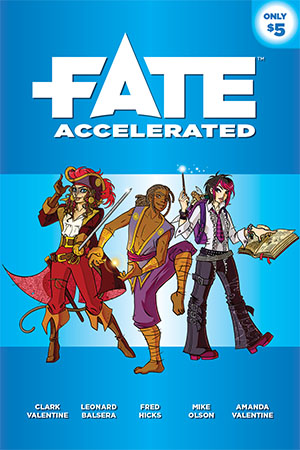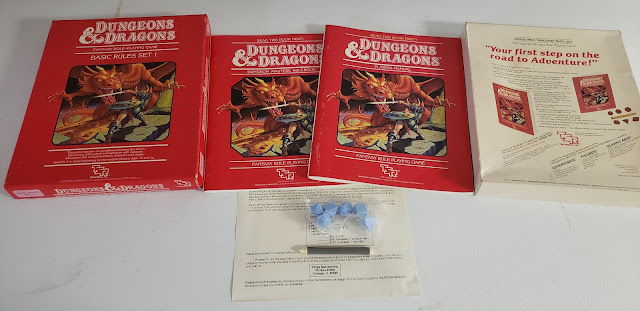
I'm going to treat this as a survey/history.
1974 D&D
Traveller
GURPS or Champions
Paranoia (1st Edition)
Vampire the Masquerade
Amber Diceless Roleplay
Burning Wheel
Apocalypse World
Wrap with a comparison of D&D 3.5, 4E, and 5E, looking at how they responded to design trends.
1974 D&D
Traveller
GURPS or Champions
Paranoia (1st Edition)
Vampire the Masquerade
Amber Diceless Roleplay
Burning Wheel
Apocalypse World
Wrap with a comparison of D&D 3.5, 4E, and 5E, looking at how they responded to design trends.
https://twitter.com/IAmPhophos/status/1494046339977682954
Traveller (1977) does triple duty for me.
- Insight into what the first generation of RPGs responded to 1974 D&D.
- First science fiction game.
- Includes a Lifepath system, giving us a first step in looking at approaches to character creation.
- Insight into what the first generation of RPGs responded to 1974 D&D.
- First science fiction game.
- Includes a Lifepath system, giving us a first step in looking at approaches to character creation.

GURPS or Champions ('80s Editions)
My thesis is that RPGs pretty universally pushed "accurate simulation" through the late '70s and '80s. This is our exemplar of that trend.

My thesis is that RPGs pretty universally pushed "accurate simulation" through the late '70s and '80s. This is our exemplar of that trend.


Also gives us point-buy character creation in its fullest flower. Very sharp contrast between character GENERATION and character CREATION.
Paranoia is my odd-ball choice. Every intro class has one on the reading list, right?
But here for a reason.
- It's a comedy game. Gives a nice, sharp look at emerging diversification of creative agendas.
- It emphasizes the unexamined "simulation = good" trend in the '80s.
But here for a reason.
- It's a comedy game. Gives a nice, sharp look at emerging diversification of creative agendas.
- It emphasizes the unexamined "simulation = good" trend in the '80s.

Paranoia is a lighthearted comedy game. But its 1st Edition features, among other things, a three-tier skill specialization system. Because "simulation = good" was an unexamined premise for all RPG design; even if it made no sense for what the game was actually trying to achieve.
(I will give extra credit to any student arguing that the incredible minutia of the system was actually part of the satire of a Kafkaesque government bureaucracy. They're wrong, but it shows they're thinking critically about this.)
GURPS was also an example of universal RPG systems which were VERY popular in the '80s and '90s, and then... weren't.
One theory is the niche was definitively filled by GURPS.
The other is that universal RPGs were at their strongest BECAUSE of the "simulation = good" paradigm.
One theory is the niche was definitively filled by GURPS.
The other is that universal RPGs were at their strongest BECAUSE of the "simulation = good" paradigm.
Once you move past the idea, demonstrated in Paranoia, that "good system" is a Platonic ideal divorced from a game's creative agenda, the appeal of a "universal system" is not eliminated, but significantly diminished.
Which brings us to Vampire: The Masquerade. A hugely important game that grappled mightily with the idea of pushing a creative agenda other than simulation. 

The Storyteller system is interesting to analyze because (a) it ultimately fails to achieve its storytelling goal (and analyzing failure is a great way to learn); and
(b) It's virtually impossible to understand GNS theory without the context of Storyteller.
(b) It's virtually impossible to understand GNS theory without the context of Storyteller.
Before we get to GNS, though, Amber Diceless Role-Playing will be our exemplar of the snap-back against detailed simulation.
Emphasized by the diceless engine, Amber was one of many early '90s games that was fed up with complexity and bounced to the opposite extreme.
Emphasized by the diceless engine, Amber was one of many early '90s games that was fed up with complexity and bounced to the opposite extreme.

Also an elegant tour de force for designing mechanics customized to the creative agenda and setting of the game.
Plus, Amber features alternative structures for organizing campaigns and extending play beyond the session.
A lot of mileage from one title.
Plus, Amber features alternative structures for organizing campaigns and extending play beyond the session.
A lot of mileage from one title.
Burning Wheel.
There are a lot of Forge-era indie games we could choose. One could argue we should go with a game by Edwards or Baker. (The latter is covered by AW.)
BW is just better. And synthesizes a wider range of innovations. So that's what I'm tapping.
There are a lot of Forge-era indie games we could choose. One could argue we should go with a game by Edwards or Baker. (The latter is covered by AW.)
BW is just better. And synthesizes a wider range of innovations. So that's what I'm tapping.

Which brings us to Apocalypse World.
- PbtA is the single biggest non-D&D influence on RPG design in the last decade, so basically essential.
- As previously mentioned, Baker is a seminal figure and his design philosophy should be highlighted.
Once again, double duty.
- PbtA is the single biggest non-D&D influence on RPG design in the last decade, so basically essential.
- As previously mentioned, Baker is a seminal figure and his design philosophy should be highlighted.
Once again, double duty.

Which brings us to the big wrap-up of the course: Comparing D&D 3.5, 4E, and 5E.
D&D, of course, is the 10,000 lbs. gorilla in the RPG design room. So for an intro course we absolutely need to cover its evolution.


D&D, of course, is the 10,000 lbs. gorilla in the RPG design room. So for an intro course we absolutely need to cover its evolution.



Post-1974, D&D has also been extremely reactive in its design. It largely does not innovate, but its massive gravity means anything it refines is reflected back into the industry in a massively disproportional way.
So having broadly covered the history of RPG design, looking at how D&D reacted to (or didn't react to) those design trends is a great way to review and critically analyze everything we've learned in the course.
The final list also gives us (coincidentally, I didn't actually plan this) two games from each decade ('70s through '10s) with an extra D&D.
This was a good gut-check to make sure I wasn't getting too biased.
This was a good gut-check to make sure I wasn't getting too biased.
Notable things missing:
FATE. Massive influence in the decade before PbtA.
Storytelling games. Only peripherally looking at how STGs have influenced RPG design is iffy. You can easily make a case for throwing in Once Upon a Time or Microscope or Ten Candles.

FATE. Massive influence in the decade before PbtA.
Storytelling games. Only peripherally looking at how STGs have influenced RPG design is iffy. You can easily make a case for throwing in Once Upon a Time or Microscope or Ten Candles.


RPGs in a Box. Stuff like Arkham Horror, Gloomhaven, and Descent aren't actually RPGs, but they're in the same design space.
Starter Sets. There are unique design considerations in making an effective starter set. We didn't cover them at all.

Starter Sets. There are unique design considerations in making an effective starter set. We didn't cover them at all.


Organization-based play. Ars Magica, Blades in the Dark, Red Markets, etc.
This is a persistent design goal since Day 1 in RPGs. I can touch on it a bit with Traveller, but it's really exploded in the past decade and not having a more recent example is a limitation.


This is a persistent design goal since Day 1 in RPGs. I can touch on it a bit with Traveller, but it's really exploded in the past decade and not having a more recent example is a limitation.



Call of Cthulhu.
Just because it's Call of Cthulhu.
But my goal isn't Most Important RPGs (CoC is easily Top 5); it's Introduction to RPG Game Design.
There's stuff to teach here, but not enough hooks to knock others off the list.
There's only so many hours in a semester.
Just because it's Call of Cthulhu.
But my goal isn't Most Important RPGs (CoC is easily Top 5); it's Introduction to RPG Game Design.
There's stuff to teach here, but not enough hooks to knock others off the list.
There's only so many hours in a semester.

• • •
Missing some Tweet in this thread? You can try to
force a refresh







